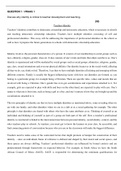QUESTION 1 / VRAAG 1
Discuss why identity is critical to teacher development and teaching.
(50)
Teachers Identity
Teachers’ identities contribute to democratic citizenship and democratic education, which is necessary in schools
and teaching democratic citizenship education. Teachers have multiple identities consisting of self and
professional identities. This essay will be addressing the importance of professional identities in the school as
well as how it prepares the future generations in schools with democratic citizenship education.
Identity involves the personal characteristics of a person. It consists of our membership in social groups such as
race, ethnicity, religion, gender, class etc. It also consists of one’s traits and traits that others ascribe to us. One’s
identity is experienced and will be mediated by social groups such as racial groups, ethnicities, religions, gender,
age, class, sexual orientations and even our physical abilities. Our identity locates us in the social world, affecting
all that we do, say, think or feel. Therefore, I say that we have multiple identities all relating and emerging to/from
different contexts. Family is usually the biggest influencing factor with how our identities are formed, as you
belong to a particular group, for example being a Christian. There are specific rules, values and morals that are
involved with being a Christian. One’s gender has even got socializations and expectations attached to it. For
example, girls are expected to play with dolls and boys on the other hand, are expected to play with cars. One’s
nature is what one is born into, such as being a girl or a boy; and one’s nurture is how they are brought up and the
socializations attached to it.
The two principles of identity are that we have multiple identities as mentioned above, some revealing when we
are with our family, and other identities when we are in a club or at a social gathering for example. The other
principle is that identities are shared with others who have the same attributes as us. Thinking of yourself as an
individual and thinking of yourself as part of a group are both part of the self. How a teacher’s professional
identity is constructed is linked to the interconnections between personal identity, social identity, context, and the
roles teachers play in schools. As teachers, you must get to know the learners in your class, be accessible, and
find connecting points of conversation because who you are in the classroom will make the biggest difference.
Teachers need to make sense of the contextual factors that might promote or hamper the construction of their
identity – since an individuals frame of reference is defined and shaped by their moral and social spaces, and
these spaces are always shifting. Teachers’ professional identities are influenced by formal contexts and are
predetermined through frameworks on expected behavior. For example, in South Africa we have the South
African Council of Ethics (SACE). SACE is responsible for determining the minimum qualifications for
, registering, coordinating, and regulating teacher education programs, whilst providing academic support to
teachers and promoting innovation for teacher education. Teacher professional identity is of vital importance in
the teaching profession, and constructs ideas of how teachers need to be, act, understand in both their workplace
and in society. Although, these personal teacher identities are influenced by beliefs, values, perceptions, and
judgements. For example, due to a teachers’ values and beliefs, might believe corporal punishment would work
in the best interests of the learners in an all-boys school, yet it is against school policy, and illegal. Such tensions
between professional and personal teacher identities are formed and make these identities unclear, as they are
fluid and dynamic in relation to different contexts.
Due to the South African history, and schools being previously segregated, so were teachers and their teaching.
Teachers only taught in specific schools that matched their ethnic and racial identity. Due to this, it is visible that
there are still groups of individuals in schools that are being treated unfairly and unequally due to their racial or
ethnic group. These biases and misrecognition or non-recognition of specific learners can impose harm and is a
form of oppression which distorts someone into a reduced state of being. It also results in learners disengaging in
the schoolwork. Teachers need to change their conceptions of others and treat everyone with the rightfully respect
that they deserve. Teachers need to ask themselves whether they reflect these behaviors because we have all been
damaged by our society due to colonialization and apartheid (although some more than others). Teachers often
allow their image of another person to interfere with how they judge that person, as well as their capability which
really should never be the case. Often there is the misconception of white competence and black incompetence.
This is an extremely harmful judgement that does not reflect professional identity. An example of this happening
occurred in Johannesburg where a private school was found guilty of a teacher telling black learners that they
were only getting good marks because white learners sat next to them in the classroom. This is an example of
downright racism.
For schools to head towards teaching democratic citizenship education, they need to carefully watch the
professional identities of teachers and ensure that they head towards socially transforming the classroom, where
equal educational opportunities are given, human rights, inclusivity, environmental and social justice is
incorporated according to our constitutional rights, and lastly by valuing indigenous knowledge systems –
acknowledging the rich history and heritage of South Africa and incorporating it into the curriculum to decolonize
it. Teachers should incorporate qualities such as equity, tolerance, multilingualism, openness, accountability, and
social honor into their professional identities. Although, it remains doubtful whether teachers can teach
democratic citizenship education, the values of democracy can produce a greater awareness of what it means to
be a good citizenship and teachers should act how they would like their learners to act.




